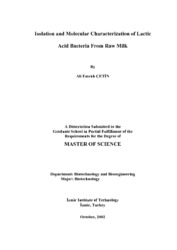Please use this identifier to cite or link to this item:
https://hdl.handle.net/11147/3705Full metadata record
| DC Field | Value | Language |
|---|---|---|
| dc.contributor.advisor | Yenidünya, Ali Fazıl | en |
| dc.contributor.author | Çetin, Ali Emrah | - |
| dc.date.accessioned | 2014-07-22T13:52:11Z | - |
| dc.date.available | 2014-07-22T13:52:11Z | - |
| dc.date.issued | 2002 | en |
| dc.identifier.uri | http://hdl.handle.net/11147/3705 | - |
| dc.description | Thesis (Master)--Izmir Institute of Technology, Biotechnology, Izmir, 2002 | en |
| dc.description | Includes bibliographical references (leaves: 84-91) | en |
| dc.description | Text in English; Abstract: Turkish and English | en |
| dc.description | viii, 91 leaves | en |
| dc.description.abstract | Lactic acid bacteria are industrially important because they are used as starter cultures in food production, they produce antimicrobial compounds and they are used in the formulation of probiotic products. Several dairy products such as raw milk, traditionally fermented cheese (produced without the use of commercial starter cultures), and kefir which are produced in country are good sources of novel lactic acid bacterial strains. These lactic acid bacterial strains may have potential for the production of new fermented dairy products with characteristic aroma and flavour. Therefore, the isolation of lactic acid bacteria from natural products and their identification are important. For many years, several phenotypic methods have been used to identify lactic acid bacteria, but they are not often capable of effectively differentiating subspecies and strains within a genus. New methods based on the genotypic properties have been developed and used for the proper classification of bacteria The aim of this research was the isolation of lactic acid bacteria from raw milk and the identification of the lactic acid bacterial isolates by biochemical tests, polymerase chain reaction (PCR)-based methods and pulsed field gel electrophoresis (PFGE). Lactic acid bacteria were isolated from cow.s raw milk and identified by biochemical reactions. Two PCR based methods, ITS-PCR (Internal Transcribed Spacer-PCR) and PCR-RFLP (PCR- Restriction Fragment Length Polymorphism) were then used for the differentiation of reference strains of lactic acid bacteria. PCR-RFLP method, based on the amplification and restriction digestion of 16S rRNA gene, was found to be useful for the identification. Thirteen raw milk isolates were identified as Lactococcus lactis, 24 as Enterococcus spp., and 2 as Lactococcus lactis subsp. cremoris by PCR-RFLP method. Pulsed field gel electrophoresis was also optimized for the identification of reference strains. Restriction profiles obtained by digesting the genomic DNA with Sma I enabled differentiation of the reference strains of Lactococcus, Enterococcus, and Streptococus thermophilus. | en |
| dc.language.iso | en | en_US |
| dc.publisher | Izmir Institute of Technology | en |
| dc.rights | info:eu-repo/semantics/openAccess | en_US |
| dc.subject.lcc | QR121. C48 2002 | en |
| dc.subject.lcsh | Lactic acid bacteria | en |
| dc.subject.lcsh | Biotechnological microorganisms--Isolation | en |
| dc.subject.lcsh | Milk--Microbiology | en |
| dc.title | Isolation and molecular characterization of lactic acid bacteria from raw milk | en_US |
| dc.type | Master Thesis | en_US |
| dc.institutionauthor | Çetin, Ali Emrah | - |
| dc.department | Thesis (Master)--İzmir Institute of Technology, Bioengineering | en_US |
| dc.relation.publicationcategory | Tez | en_US |
| item.fulltext | With Fulltext | - |
| item.grantfulltext | open | - |
| item.languageiso639-1 | en | - |
| item.openairecristype | http://purl.org/coar/resource_type/c_18cf | - |
| item.cerifentitytype | Publications | - |
| item.openairetype | Master Thesis | - |
| Appears in Collections: | Master Degree / Yüksek Lisans Tezleri | |
Files in This Item:
| File | Description | Size | Format | |
|---|---|---|---|---|
| T000140.pdf | MasterThesis | 1.8 MB | Adobe PDF |  View/Open |
CORE Recommender
Page view(s)
170
checked on Nov 18, 2024
Download(s)
130
checked on Nov 18, 2024
Google ScholarTM
Check
Items in GCRIS Repository are protected by copyright, with all rights reserved, unless otherwise indicated.